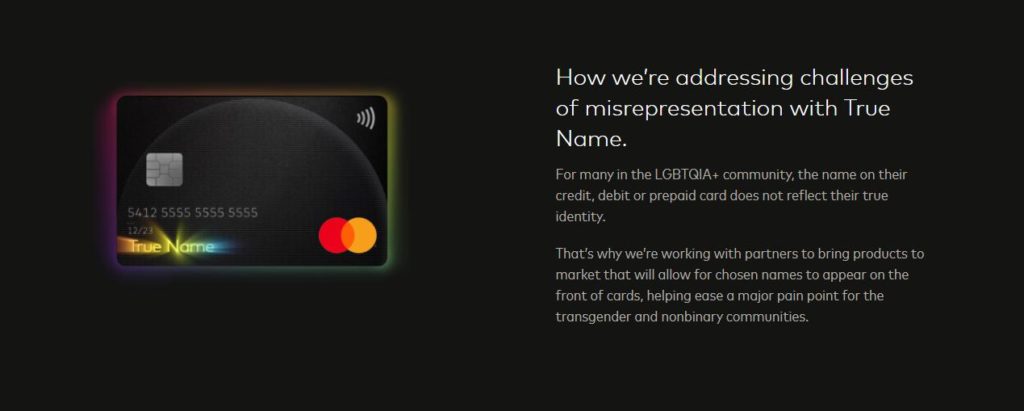Mastercard ‘True Name’ Feature Allows ‘Transgenders’ to Use Their Chosen Name on Debit, Credit Cards
 NEW YORK — The financial services corporation Mastercard has rolled out a so-called “True Name” feature that allows those who identify as transgender or “non-binary” to use their chosen name on their debit and credit cards in order to avoid being detected as such when making a purchase.
NEW YORK — The financial services corporation Mastercard has rolled out a so-called “True Name” feature that allows those who identify as transgender or “non-binary” to use their chosen name on their debit and credit cards in order to avoid being detected as such when making a purchase.
“For many in the LGBTQIA+ community, the name on their credit, debit or prepaid card does not reflect their true identity,” the corporation’s website states. “That’s why we’re working with partners to bring products to market that will allow for chosen names to appear on the front of cards, helping ease a major pain point for the transgender and nonbinary communities.”
Mastercard released a video about the effort at the end of Pride Month, showing a woman who identifies as a man making a purchase at a local convenient store.
“For transgender people, a secure payment doesn’t mean protecting yourself from someone buying sneakers with your card,” the voiceover says. “No, if you’re transgender, a secure payment means paying for something without being judged, questioned, disrespected, humiliated, harassed [and] even assaulted simply because the name on your card doesn’t match how you identify.”
As the text is being spoken, the promotional production zeroes in on a number of those who identify as the opposite sex. The individual at the convenient store counter hands over her Mastercard, looking up at the cashier to see how he might react. He smiles.
“This is about more than keeping your card safe,” the ad states. “It’s about keeping us safe.”
“True Name by Mastercard, the first card that allows you to display your chosen name, because that’s who you truly are.”
Among the current participants offering the True Name feature are Citi and BMO Harris Bank, with Mastercard announcing Citi’s participation in a press release on Monday.
“At Citi, we are passionate about ensuring our customers feel recognized, accepted and empowered to be their true selves,” Carla Hassan, Citi chief marketing officer, said in a statement.
“We’re incredibly proud to launch the True Name feature through our relationship with Mastercard,” she said, “because we strongly believe that our customers should have the opportunity to be called by the name that represents who they really are.”
Mastercard was one of 200 companies to join an amicus brief regarding a trio of cases before the U.S. Supreme Court to ask that it read homosexuality and gender identity into the meaning of “sex” in the Civil Rights Act of 1964.
As previously reported, the Supreme Court did rule in June, as written by Trump appointee Neil Gorsuch, that “[a]n employer who fires an individual for being homosexual or transgender fires that person for traits or actions it would not have questioned in members of a different sex. Sex plays a necessary and undisguisable role in the decision, exactly what Title VII forbids.”
One of the cases before the court involved a Christian funeral home, whose owner fired a man after he requested to begin wearing a skirt uniform to work instead of a men’s suit. The Supreme Court ruling meant that the Christian funeral home was not permitted under anti-discrimination law to let the employee go because of his desire to present himself as a woman.
THE GOSPEL

While some view transgenderism and gender confusion as a medical condition, Christians believe the matter is also, at its root, a spiritual issue — one that stems from the same predicament all men everywhere face without Christ.
The Bible teaches that all are born with the Adamic sin nature, having various inherent feelings and inclinations that are contrary to the law of God, and being utterly incapable of changing by themselves.
It is why Jesus came: to “save His people from their sins” (Matthew 1:21).
Scripture outlines that Jesus came to be the propitiation for men’s sins (1 John 2:2; 1 John 4:10), a doctrine in Christianity known as substitutionary atonement, and to save men from the wrath of God for their violations against His law (Romans 4:25, Romans 5:9, Romans 5:16), a doctrine known as justification.
The Bible also teaches about regeneration, as in addition to sparing guilty men from eternal punishment, Christ sent his Holy Spirit to make those who would repent and believe the gospel new creatures in the here and now, with new desires and an ability to do what is pleasing in the sight of God by His indwelling and empowerment (Ezekiel 11:19, 2 Corinthians 5:17, Titus 3:5).
Jesus said that men must be born again, and have their very nature transformed by the Spirit from being in Adam to being in Christ, or they cannot see the Kingdom of God (John 3:3-8).
The late Anglican preacher J.C. Ryle once said, “Can any change his own heart? No! The thing is impossible. We can no more quicken and impart life to our souls than we can to our bodies; we can no more rise and become new men in our own strength than wash away sins by our own performances. It is impossible! The natural man is as helpless as Lazarus was when he lay still and cold and motionless in the tomb. We may remove the stone, as it were, and expose the sad work of death — but we can do no more.”
“There must be a power far mightier than any power of earth in exercise before the natural man can awake and arise and come forth as a new creature. And to do all this is the special office of the Spirit of Christ, the Holy Spirit, whom Jesus promised to send. It is He who quickens; it is He who gives life.”
Become a Christian News Network Supporter…







Comments are closed.